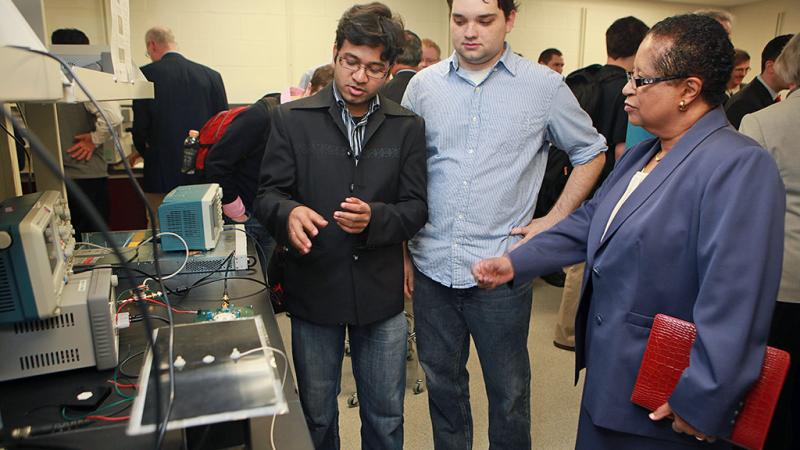New Electrical Engineering Lab Encourages Student Tinkering and Innovation
October 3, 2012

Rensselaer Polytechnic Institute today celebrated the opening of the Douglas Mercer ’77 Laboratory for Student Exploration and Innovation.
A part of the Department of Electrical, Computer, and Systems Engineering (ECSE), the Mercer Lab aims to promote and encourage the “lost art of tinkering” with electronics components. The facility provides an open shop environment and sophisticated hardware for students to work on class and research projects. Additionally, the Mercer Lab will sponsor electronics design competitions for students.
The lab was made possible by a $500,000 endowment gift from Mercer, Class of 1977, who was a fellow at Massachusetts-based semiconductor firm Analog Devices Inc. (ADI) from 1995-2009 and is now consulting with the company on university-related projects. Mercer will support lab operations with an annual gift of $50,000. ADI donated $160,000 and is founding corporate sponsor of the lab.
“To succeed as a leading research university, it is imperative that we continue to equip our students with the necessary tools to meet the challenge of our motto, ‘Why not change the world’? The Douglas Mercer ’77 Laboratory for Student Exploration and Innovation directly addresses this challenge, and provides a rich resource that will enable us to engage, educate, and inspire the engineering and technology leaders of tomorrow,” said Rensselaer President Shirley Ann Jackson. “We thank Mr. Mercer and ADI for their generous support of this new laboratory, and applaud their forward-looking investment in the Rensselaer electrical engineering experience.”
“We are enormously grateful to Doug Mercer and ADI for making the Douglas Mercer ’77 Laboratory for Student Exploration and Innovation a reality,” said David Rosowsky, dean of the School of Engineering at Rensselaer. “The new lab builds on our reputation as an institute for practical and experiential learning, for innovation, and for creating learning spaces that both foster and enable student discovery.”
“Electrical engineering needs to be more than lectures on theory, reading textbooks, and taking exams,” Mercer said. “Aristotle said, ‘For the things we have to learn before we can do them, we learn by doing them.’ Advances in technology can now provide students with their own personal portable electronics laboratory, which removes the constraints of fixed space, equipment and schedules to conduct their experiments. However, this entry-level hardware can take the student only so far. A more advanced set of capabilities is impossible to replicate on an individual, personal basis. Electrical engineering departments seldom have room in their meager budgets to build and outfit advanced laboratories for extracurricular learning. So when presented with the proposal for a student centered open laboratory, I saw a good opportunity to positively impact the students.”
“We are pleased and proud to support the Douglas Mercer ’77 Laboratory for Student Exploration and Innovation at Rensselaer,” said David Robertson, ADI vice president of analog technology. “As a fellow at Analog Devices, Doug showed that the lab was not simply the place where great ideas were validated—the hands-on work in the lab was the source of discovery, deeper understanding, and breakthrough product innovation. Many engineers from prior generations came into electronics after a childhood of tinkering with radios, TV sets, and other gadgets. These sorts of experiences are harder to come by in the video game and smart phone app generation. Doug’s remarkable career is testimony to the importance of this ‘hands-on feel’ for an electrical engineer—we look forward to the impact this lab will have in helping Rensselaer convert smart students into innovative engineers.”
“The Douglas Mercer ’77 Laboratory for Student Exploration and Innovation is built for tinkering in electronics, the largely undirected process of exploratory thinking and experimentation,” said ECSE Department Head Kim Boyer. “Tinkering is an American tradition that fosters innovation and promotes integrative learning and intuition. It provides an exceptional vehicle for exploring and understanding the limits of theory versus practice and is arguably an essential component of a modern engineering education. We are so proud to provide our students with this world-class facility, thanks to the extraordinary generosity of Mr. Mercer and the critical support of Analog Devices.”
Since its creation in 1909, the Rensselaer Department of Electrical Engineering has grown to include computer and systems engineering. Graduates of the department include the founder of the television industry, the co-inventor of the chip at the heart of every computer, a storied leader of IBM, the judge whose decision paved the way for generic drugs, and other visionary leaders, researchers, and entrepreneurs.
Today, ECSE is ranked as the nation’s 14th best electrical engineering undergraduate program and 17th best graduate electrical engineering program by U.S. News & World Report. The department enrolls nearly 500 undergraduate students and more than 120 graduate students. ECSE faculty total more than $12 million in annual research expenditures, and are world leaders in the fields of electrical communications, signal processing, robotics, computer vision, smart grids and energy transmission, 3-D integrated computer chips, and many other leading-edge research areas. Since 2010, three ECSE alumni have been awarded the National Medal of Technology by President Barack Obama.
For more information on electrical engineering at Rensselaer, visit:
- Department website
http://www.ecse.rpi.edu - White House To Honor Rensselaer Electrical Engineering Alumnus With National Medal of Technology and Innovation
http://news.rpi.edu/update.do?artcenterkey=2930 - Digital Camera Pioneer Steven Sasson To Receive Rensselaer Polytechnic Institute 2011 Davies Medal
http://news.rpi.edu/update.do?artcenterkey=2923 - 100 Years of Excellence: Celebrating a Century of Engineering Innovation
http://www.ecse.rpi.edu http://news.rpi.edu/update.do?artcenterkey=2552 - Bringing the Benefits of the Mobile Studio Project to Ghana
http://www.rpi.edu/about/inside/issue/v5n1/mobile.html